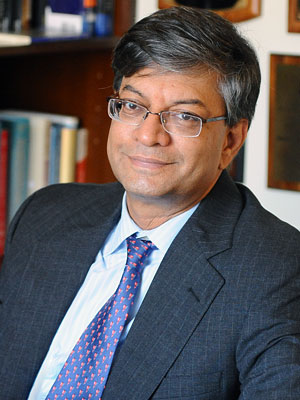Session: Past and Future of Process/Product Analytics & Machine Learning, including Education and Workforce Development
Chair: Prof. Eva Sorensen, University College London
Combining symbolic and numeric AI: Challenges and opportunities in research and education
Venkat Venkatasubramanian,  Samuel Ruben-Peter G. Viele Professor of Engineering, Columbia University
Samuel Ruben-Peter G. Viele Professor of Engineering, Columbia University
The stunning progress of machine learning (ML) in applications such as computer vision, game playing, and natural language processing has many scientists and engineers excited about the potential opportunities in traditional science and engineering domains. However, there is an essential difference between applying ML in these applications versus physiochemical (and biological) domains. The latter is governed by fundamental laws of physics and chemistry (and biology), which is typically not the case in the former. Thus, while purely data-driven machine learning has its immediate uses, the long-term success of machine learning in scientific and engineering domains, I believe, would depend on leveraging first-principles knowledge effectively. This requires the careful integration of symbolic AI (i.e., knowledge-based reasoning framework) with numeric AI (i.e., machine learning). Although in the current excitement about machine learning, many seem to have forgotten the impressive progress made in the 1980s and 1990s in symbolic AI, those advances would play an important role in the future as we develop first-principles-based hybrid-AI models for applications in science and engineering. The exciting and intellectually challenging problems lie in developing such conceptual frameworks as mechanism-based causal explanations, domain-specific knowledge discovery engines, and analytical theories of emergence. In this talk, I discuss these challenges and opportunities going forward both in research and in education.
Venkat Venkatasubramanian is Samuel Ruben-Peter G. Viele Professor of Engineering in the Department of Chemical Engineering, Professor of Computer Science (Affiliate), and Professor of Industrial Engineering and Operations Research (Affiliate) at Columbia University. His research contributions have been in the areas of process fault diagnosis and risk management, materials discovery analytics, pharmaceutical engineering, free-market dynamics, and income inequality. He received his BS in chemical engineering from the University of Madras, his MS in Physics from Vanderbilt, and a PhD in chemical engineering from Cornell. He is a fellow of the American Institute of Chemical Engineers, which also awarded him the Computing in Chemical Engineering award in 2009. He joined the faculty of Columbia Engineering in 2012. Prior to that, he taught chemical engineering at Purdue University, where he won the Norris Shreve Prize for outstanding teaching three times.
Data-driven engineering education with hands-on learning
John D. Hedengren,  Professor, Brigham Young University
Professor, Brigham Young University
Data engineering with acquisition, transport, curation, and storage of data has emerged as a key role in Industry 4.0. Aspiring data scientists have many online repositories and extensive example datasets that demonstrate principles of supervised and unsupervised learning. These datasets are often curated to present sanitized data sets to focus on the applications of classification and regression. This presentation shares new resources for hands-on data-driven engineering to teach aspiring data scientists important data engineering skills in collection, cleansing, pipelines, storage, and quality assessments.
Dr. John Hedengren is a Professor at Brigham Young University in the Chemical Engineering Department. He leads the BYU Process Research and Intelligent Systems Modeling (PRISM) group with a current focus on structured machine learning for optimization of energy systems, unmanned aircraft, and drilling. Prior to BYU he worked in industry for 7 years on nonlinear estimation and predictive control for polymers. His work includes the APMonitor Optimization Suite with a recent extension to the Python GEKKO language. He led the development of the Arduino-based Temperature Control Lab that is currently used by 70 universities for process control education. His 85 publications span topics of data science, machine learning, smart grid optimization, unmanned aerial systems, and predictive control.